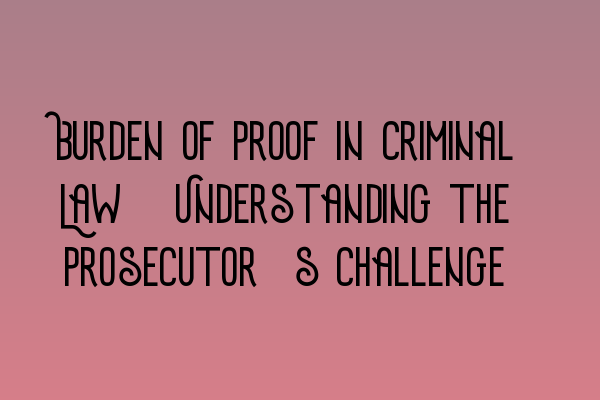The Burden of Proof in Criminal Law: Understanding the Prosecutor’s Challenge
Introduction
In the field of criminal law, the burden of proof rests on the prosecution. It is the responsibility of the prosecutor to convince the court beyond a reasonable doubt that the accused is guilty of the crime charged. Understanding the intricacies of the burden of proof is crucial for both aspiring criminal law practitioners and anyone interested in the criminal justice system.
Exploring the Burden of Proof
The burden of proof is a fundamental aspect of the legal system. It ensures that individuals are not wrongfully convicted and safeguards the presumption of innocence until proven guilty. In criminal cases, the prosecution must present evidence that is both relevant and admissible to establish the guilt of the accused.
The burden of proof differs from the standard of proof. While the burden of proof lies with the prosecutor, the standard of proof is the degree to which the prosecution must prove their case. In criminal cases, the standard of proof is “beyond a reasonable doubt,” which is the highest standard of proof in the legal system.
One of the key challenges faced by prosecutors is gathering and presenting evidence that meets the standard required to secure a conviction. This involves thorough investigation, collecting witness statements, analyzing forensic evidence, and building a compelling case that addresses all elements of the crime charged.
The Role of the Defense
It’s important to note that the burden of proof lies solely with the prosecution. The defense does not have an obligation to prove the innocence of the accused. However, the defense can present evidence and arguments that raise doubts or question the credibility of the prosecution’s case.
The defense can also utilize legal strategies to challenge the admissibility or reliability of the evidence presented by the prosecution. This includes cross-examining witnesses, presenting expert testimony, and highlighting any inconsistencies or weaknesses in the prosecution’s case.
Related Articles
If you’re interested in expanding your expertise in criminal law and practice, we recommend checking out the following articles:
- Workshops and Seminars on Criminal Practice: Expanding Your Expertise
- Updates in UK Criminal Laws: Staying Informed and Prepared
- Enhancing Your SQE Criminal Law Study Group Experience
- Decoding Criminal Evidence Rules: A Detailed Analysis
- Deep Dive into Fraud and Financial Crimes in the UK
By exploring these articles, you can enhance your understanding of various aspects of criminal law and stay informed about updates and changes in the legal landscape.
Conclusion
The burden of proof in criminal law highlights the responsibility of the prosecution to establish the guilt of the accused beyond a reasonable doubt. It is a challenging task that requires extensive investigation, presentation of relevant evidence, and adherence to the highest standard of proof. Understanding this concept is crucial for anyone involved in the field of criminal law, whether as a practitioner or as an informed member of society.
For further information and resources on criminal law and practice, feel free to explore our website and stay tuned for more insightful articles.
